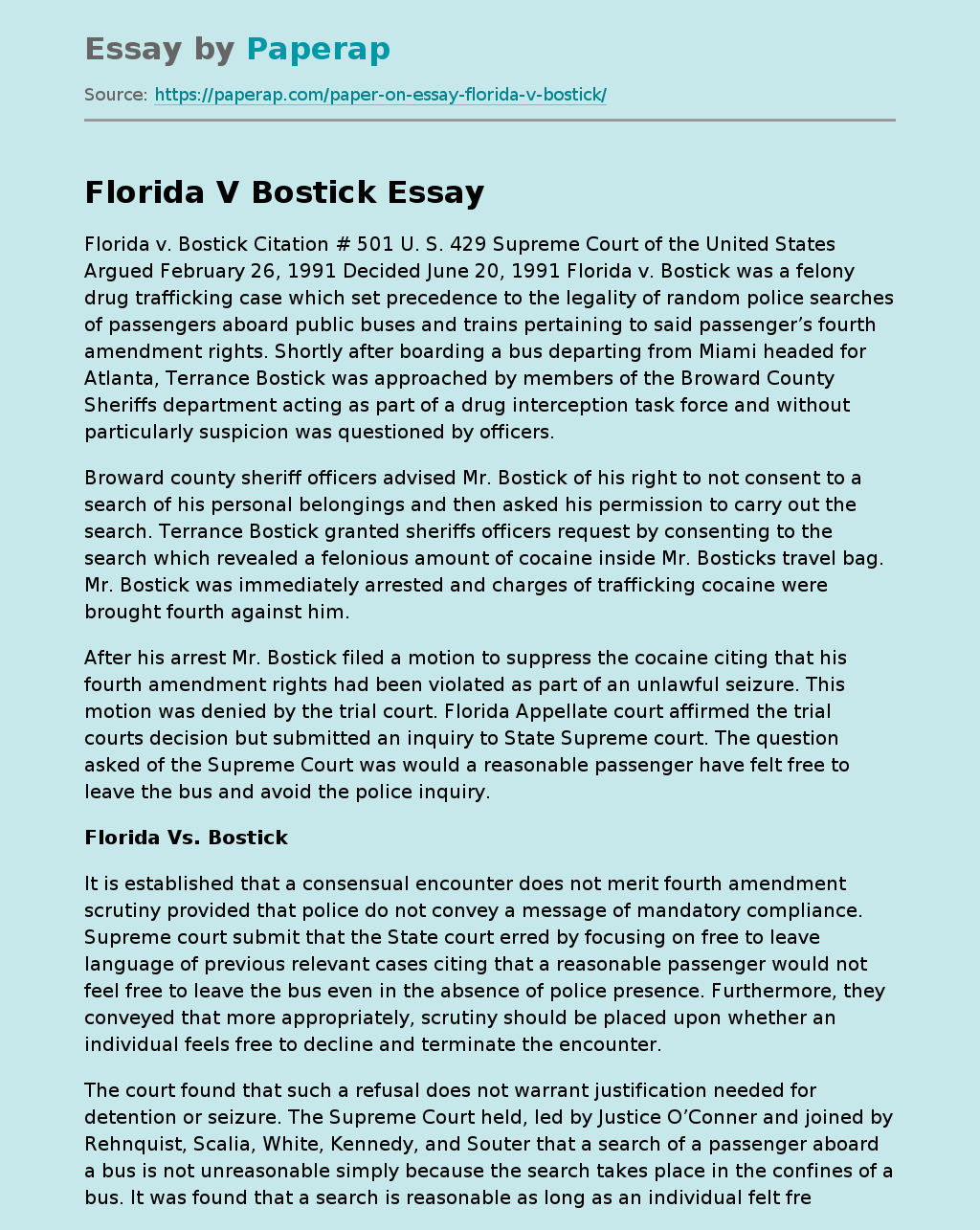Florida V Bostick
Florida v. Bostick Citation # 501 U. S. 429 Supreme Court of the United States Argued February 26, 1991 Decided June 20, 1991 Florida v. Bostick was a felony drug trafficking case which set precedence to the legality of random police searches of passengers aboard public buses and trains pertaining to said passenger’s fourth amendment rights. Shortly after boarding a bus departing from Miami headed for Atlanta, Terrance Bostick was approached by members of the Broward County Sheriffs department acting as part of a drug interception task force and without particularly suspicion was questioned by officers.
Broward county sheriff officers advised Mr. Bostick of his right to not consent to a search of his personal belongings and then asked his permission to carry out the search. Terrance Bostick granted sheriffs officers request by consenting to the search which revealed a felonious amount of cocaine inside Mr. Bosticks travel bag. Mr. Bostick was immediately arrested and charges of trafficking cocaine were brought fourth against him.
After his arrest Mr.
Bostick filed a motion to suppress the cocaine citing that his fourth amendment rights had been violated as part of an unlawful seizure. This motion was denied by the trial court. Florida Appellate court affirmed the trial courts decision but submitted an inquiry to State Supreme court. The question asked of the Supreme Court was would a reasonable passenger have felt free to leave the bus and avoid the police inquiry.
Florida Vs. Bostick
It is established that a consensual encounter does not merit fourth amendment scrutiny provided that police do not convey a message of mandatory compliance.
Supreme court submit that the State court erred by focusing on free to leave language of previous relevant cases citing that a reasonable passenger would not feel free to leave the bus even in the absence of police presence. Furthermore, they conveyed that more appropriately, scrutiny should be placed upon whether an individual feels free to decline and terminate the encounter.
The court found that such a refusal does not warrant justification needed for detention or seizure. The Supreme Court held, led by Justice O’Conner and joined by Rehnquist, Scalia, White, Kennedy, and Souter that a search of a passenger aboard a bus is not unreasonable simply because the search takes place in the confines of a bus. It was found that a search is reasonable as long as an individual felt free to decline the request of police and that police do not act in a coercive manner during the questioning of an individual.
The Supreme Court found that in the absence of such coercion there was no justification for the Florida courts per se rure that a seizure had accured simply because an encounter takes place on a bus. Justice Marshall, finding Justice O’Conner ruling disagreeable submitted a letter of dissent disputing Justice O’Conner ruling. Justice Marshall put forth his opinion that while Justice O’Conner focused on the fact that Bostick was advised of his right to refuse the search, in his opinion it was obvious that Mr. Bostick was not free to terminate the inquiry. He also cited that if Mr.
Bostick had been seized in violation of his fourth amendment rights before being asked for permission to search, that his consent was irrelevant. In closing. After reviewing the case it is my opinions that while many people find encounters with police intimidating, it is up to the individual to exercise ones rights to the utmost of their ability. While extraneous circumstances, such as the confines to a bus may impede ones ability to leave freely, an individual who is thinking reasonably would not relinquish their right to refuse to consent with a search.
Florida V Bostick. (2019, Dec 05). Retrieved from https://paperap.com/paper-on-essay-florida-v-bostick/

